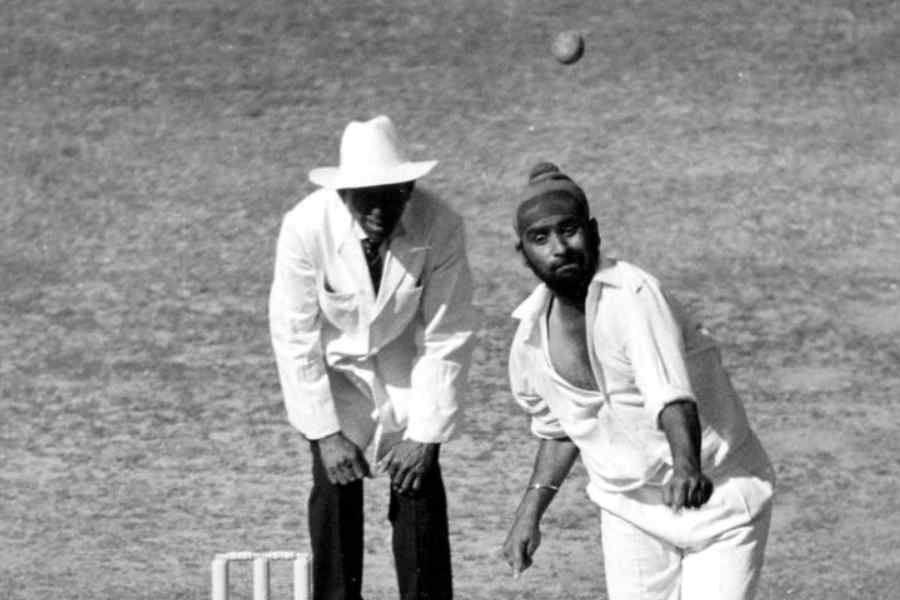Indian cricket legend Bishan Singh Bedi died in New Delhi on Monday aged 77. He was battling age-related illnesses and had undergone a few surgeries in recent years.
Bedi, regarded as one of the world’s finest-ever spin bowlers, captained India in 22 of his 67 Tests and took 266 wickets. He made his debut against the West Indies at the Eden Gardens, Calcutta, on December 31, 1966, and played his last Test against England at The Oval in 1979.
Farokh Engineer, who kept wickets in 32 Tests that Bedi played in, pays tribute.
The ball delivered from slightly wide of the crease, Ian Chappell came down the wicket expecting the flighted delivery to come in with the arm, but Bishan Singh Bedi turned it the wrong way.
It was the fourth Test of the series at the Eden Gardens in December 1969. Batting on 99, the Australian No. 3 only managed to nick it to Ajit Wadekar at first slip. Bedi’s guile and variations with subtle adjustments of his wrist and fingers were impossible to read for the best in the business.
He would commit the batters into their shots and then manage to give the ball a tweak. Just incredible and beyond imagination. I consider myself fortunate to have witnessed many such dismissals from behind the wickets during the 32 Tests we played together from 1967 to 1975.
It was a privilege and an honour to have forged such a friendship with the Sardar, something I will cherish all my life. We last met in Mumbai in the pre-Covid days but we always remained in touch through WhatsApp, exchanging notes and of course our nasty, sometimes censored, jokes.
For the last few weeks I could make out he wasn’t well. But his passing on Monday afternoon in New Delhi did come as a shock. My condolences to his wife Anju, daughter Neha and son Angad.
Bishan was a once-in-a-generation bowler, the best among the quartet of spinners. And I say this with conviction, having kept wickets against all.
Bhagwat Chandrasekhar, Chandra to us, was a special case having been affected by polio in his childhood which left his right arm withered. He performed under adverse conditions, turning his handicap into an advantage.
But Bishan was equally good and arguably could match Vinoo Mankad. I have kept wickets against Vinoo too, in the Kanga League in Mumbai for the CCI. All six balls in an over from Vinoo were different and he was one of the greatest all-rounders. It’s unfair to compare players from different eras but Bishan was natural and classy.
An easy run-up, the smooth movement of the arms, the rotation of the fingers over the ball and finally the follow-through. It was all poetry in motion as his action was famously called.
Besides 1,560 first-class victims, Bishan claimed 266 wickets from 67 Tests.
He was always reluctant to have a gully and short extra cover but had to budge when I insisted and often got the rewards almost instantly. “Paaji, your field settings are always something I can trust,” would be his patent way of saying thank you.
We always had our own little ways of plotting dismissals, be it through discussions in the middle of the wicket or change of ends. There were also a few hand signals we often resorted to, to identify any weakness in a batsman.
He was never afraid of getting hit for boundaries and would still toss the ball up. He wasn’t like Bapu Nadkarni who was accurate but never could extract much turn.
Bishan always spun the ball, which contributed to his wicket-taking abilities. His length was immaculate and he could land the ball nine out of 10 times on a small coin.
We didn’t play too many Tests in those days and Bishan was hard to unravel. I remember how Tom Graveney and Geoff Boycott failed to read Bishan’s lengths and were stumped.
Our friendship grew while playing for the World XI along with Sunil Gavaskar during the tour of Australia in 1971-72.
We used to go out for dinners and even cooked meals together.
When Bishan fell in love with Australian Glenith on the tour of 1967-68, he trusted me to break the news to his father in Delhi.
We got along very well and spoke in Punjabi. I used to crack Sardar jokes while he used to take the mickey out of Parsis.
We used to have a hearty and affectionate laugh during our evening drink.
You always knew where you stood with him and he always spoke his mind. If he didn’t like anyone he would make it clear.
His outspoken nature often landed him in trouble in his later life but he remained cool.
A hard taskmaster, he even threatened to dump the Indian team into the sea as coach in 1990 after losing a match in Christchurch.
Sometimes he may have been ruled by emotions but he always had the good of Indian cricket in mind.
(As told to Indranil Majumdar)












